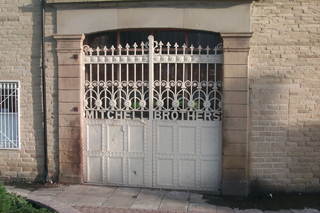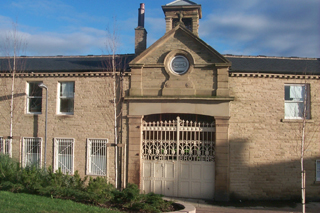| THOMAS MITCHELL and FAMILY Younger BROTHER of Francis Mitchell b 1779 Baptism: THOMAS Mitchell 11th December 1787 Bradford Parish Church, Yorkshire England Father : John Mitchell Occupation - Weaver =========================================================== Marriage (to be confirmed) Groom : THOMAS Mitchell Bride : LYDIA Mitchell Marriage: 14 OCT 1811 Halifax, Yorkshire, England =========================================================== Children of Thomas Mitchell and Lydia Mitchell ANN Mitchell - International Genealogical Index Gender: Female Christening: 31 MAY 1812 Halifax, Yorkshire, England ELIZABETH Mitchell - International Genealogical Index Gender: Female Christening: 06 AUG 1815 Bradford, Yorkshire, England JOSHUA Mitchell - International Genealogical Index Gender: Male Christening: 28 JUN 1818 Bradford, Yorkshire, England JOHN Mitchell - International Genealogical Index Gender: Male Christening: 21 JAN 1821 Bradford, Yorkshire, England SARAH Mitchell - International Genealogical Index Gender: Female Christening: 23 MAR 1823 Bradford, Yorkshire, England ABRAHAM Mitchell - International Genealogical Index Gender: Male Christening: 20 MAR 1825 Bradford, Yorkshire, England More Information available on this link MARTHA Mitchell - International Genealogical Index Gender: Female Christening: 01 APR 1827 Bradford, Yorkshire, England MARY Mitchell - International Genealogical Index Gender: Female Christening: 08 MAR 1829 Bradford, Yorkshire, England JOSEPH Mitchell - International Genealogical Index Gender: Male Christening: 22 MAY 1831 Bradford, Yorkshire, England LYDIA Mitchell - International Genealogical Index Gender: Female Christening: 11 MAY 1834 Bradford, Yorkshire, England |
Extract from "Bradford" by Joseph Fieldhouse This extract is only part of the very interesting aspects of Bradford. A description of the book and where to obtain it is available at the end of this text. "Clogs
to Clogs in Three Generations"... When Bradford's first steam spinning mill went into production, three Mitchell brothers, Thomas, Francis and John, were in business as stuff makers in domestic premises at Bankfoot. Soon after 1819 Francis and John set up as worsted spinners in the mill built by E.C. Lister in Manchester Road, and in 1834 Thomas, along with a partner, occupied "Dick Smith's Mill" almost next door. Thomas had a large family and it was three of his sons, Joshua, Abraham and Joseph, who carried on the business as Mitchell Brothers, one of the largest manufacturers of mohair cloths. The family, who attended Annesley Chapel in Little Horton Lane, all lived in Burnett Fields, but in 1864 Abraham and Joseph built two large houses called The Parks in Rooley Lane. Abraham Mitchell, a man of some standing, was an alderman from 1874 to 1880, and could have become mayor of the town if he had wished. He was a collector of paintings, and one room in the new home - the further of the two from Bankfoot - was planned as an art gallery with roof lighting. A painting by H.H La Thangue, RA, called "The Connoisseur", showing Abraham and his family among their art treasures, is now in Cartwright Hall. Profits from business were so good that Abraham bought The Park, a large house at Eccleshill, built by Colonel Stott-Stanhope, for his son Tom, and a country estate at Tourmakeady, in Ireland, for himself. Tom Mitchell was a man of many parts. In official life he was chairman of the company and a magistrate, but in his leisure moments he was an amateur boxer; the owner of a hackney stud; an artist of considerable merit, and a popular singer and lecturer. His two sons died in the First World War, Lieutenant George Mitchell being killed in 1915 and his brother, Captain Tom Mitchell, towards the end of the fighting. George Mitchell was a boxer, too, and the Bradford Telegraph's Ready Reference and Date Book contains the following unusual entry under 14 April, 1914: "Mr G. Mitchell (amateur) donned gloves with Carpentier". This was Georges Carpentier, the French heavyweight champion, and his fight with George Mitchell was the result of a light-hearted remark made by the latter to a friend while staying in France. Mitchell said he would like nothing better than to "have a go" at Carpentier, but was most surprised a few weeks later to receive a letter from his friend saying that the fight had been arranged. George Mitchell sportingly kept his word, knowing quite well what the result would be. According to a newspaper report some amusement was caused when the challenger went into the ring on the great day without gloves, and even more when he squared up to the champion in his dressing gown. Carpentier showed how seriously he took the fight by knocking his opponent down four times in one minute thirty-five seconds. Mitchell was less worried about the defeat than about the "combing" which awaited him at home, but all was taken in good part. After the fight Carpentier said, "It was a brave thing for an amateur to do. I admire the spirit that made him do it," - and the two drank champagne together. After the Great War prospects for Mitchell Brothers seemed good, but slumps caused them to lose their trade, and in 1929 one of Bradford's oldest firms went out of business. The complex of mills on the site of "Dick Smith's", at the junction of Bowling Old Lane and Manchester Road, forms a historic corner in Bradford's industrial story. The clock above the gateway of the mill facing Manchester Road is a reminder of the tyranny exerted by timekeepers, for if the knocker-up, or the hooters which filled the air with noise from six o'clock onwards, failed to get the hands there before the big gates closed, the late comers were faced with the ignominy of going through "t'penny 'oil" - a special wicket for offenders, which meant loss of pay. When the Factories Inquiry Commission was being held, clocks were so rare that note was taken if a household possessed one, and it has been said that the factory system brought punctuality - a doubtful blessing perhaps - into the lives of ordinary people for the first time. It was in nearby Springmill Street, in 1882, that one of Bradford's major disasters occurred - the collapse of Newland's Mill chimney. At breakfast time on 28 December the 255 foot chimney, which had only been built twenty years before, crashed on to the mill, killing fifty-four people and injuring many more. A very strong wind was partly responsible for the tragedy, but the chimney began to lean while it was being built, and efforts to correct the fault weakend the structure. One of the most poignant deaths was that of a little girl, aged eight, who was taking her mother's breakfast to the mill. The mother died too. The rescuers, of course, had many harrowing tales to tell, one being the discovery of the body of a middle-aged man with a son of twelve in his arms. An aspect of the tragedy which would not seem strange at the time, however, is that a quarter of the workers killed were mere children - boys and girls under fifteen. There was very little to relieve the awful sense of loss, but a boy of ten was found alive and well, after being entombed for thirty hours, and a Manx cat survived the terrifying ordeal. 621 FIELDHOUSE Joseph, & SHARDLOW Paul
(Illus), BRADFORD. Black cloth with gilt title to spine in pictorial dustwrapper. Plan to
front and text illustrations throughout. Fine. First edition. pp.192. Longman, London 1972
£9. www.grovebookshop.co.uk/yorksaf.htm
From William Cudworth's book "Histories of Bolton and Bowling", Published 1891: Referring to Prospect Mill: "Mr Smith occupied the old mill as a worsted spinner until his failure in 1829, when Messrs Joshua Wood and Co and others took rooms in it. In 1834 Messrs Turner and Mitchell entered into occupancy of the premises as worsted spinners. The parties to this firm were Messrs George Turner and Thomas Mitchell, the latter being the father of Abraham and Joseph Mitchell, who, under the firm of "Mitchell Bros.", acquired the property by purchase in 1854, on the dissolution of partnership of Turner and Mitchell. In their hands both the premises and business have been largely developed, and as mohair spinners the firm has acquired a great reputation. Frank and Johnny Mitchell, as they are familiarly named, occupied the adjoining mill in Horton township, erected by Ellis Cunliffe Lister, Esquire. They were brothers to the above named Thomas Mitchell." |

